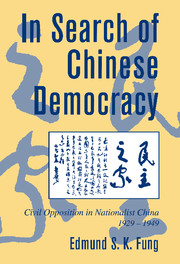Book contents
- Front Matter
- Contents
- Acknowledgments
- A Note on Romanization
- Abbreviations
- Introduction
- 1 The Dictatorial Regime
- 2 Setting the Opposition Agenda: The Issue of Human Rights, 1929–1931
- 3 The National Emergency, 1932–1936: Political and Intellectual Responses
- 4 In Defense of Democracy, 1933–1936
- 5 An Abortive Democratic Experiment: The People's Political Council, 1938–1945
- 6 Wartime Democratic Thought
- 7 The Third Force Movement: The Chinese Democratic League, 1941–1945
- 8 “Peace, Democracy, Unification, and Reconstruction,” 1946
- 9 The Last Stand of Chinese Liberalism
- Conclusion
- Selected Bibliography
- Glossary
- Index
5 - An Abortive Democratic Experiment: The People's Political Council, 1938–1945
Published online by Cambridge University Press: 22 September 2009
- Front Matter
- Contents
- Acknowledgments
- A Note on Romanization
- Abbreviations
- Introduction
- 1 The Dictatorial Regime
- 2 Setting the Opposition Agenda: The Issue of Human Rights, 1929–1931
- 3 The National Emergency, 1932–1936: Political and Intellectual Responses
- 4 In Defense of Democracy, 1933–1936
- 5 An Abortive Democratic Experiment: The People's Political Council, 1938–1945
- 6 Wartime Democratic Thought
- 7 The Third Force Movement: The Chinese Democratic League, 1941–1945
- 8 “Peace, Democracy, Unification, and Reconstruction,” 1946
- 9 The Last Stand of Chinese Liberalism
- Conclusion
- Selected Bibliography
- Glossary
- Index
Summary
Following the Marco Polo Bridge incident of July 7,1937, China went to war with Japan. Earlier a second GMD–CCP united front had been formed after the Xi'an incident of the previous December. On July 15, Chiang Kai-shek convened a conference at Lushan, a mountain resort in Jiangxi province, attended by delegates from the MPGs, nonpartisans, and other leading lights of the community, with the exception of the Communists; Chiang held separate talks with them. The conference sent a clear signal to the nation that the government was prepared to accommodate the opposition parties and to hear their views on the question of war. Because resistance to the Japanese demanded national unity, all political parties and groups accepted the government's authority and the necessity of a strong state.
The outbreak of war imposed constraints on Chinese party politics, forcing all the parties concerned to seek temporary compromises. Wartime politics, played out in the People's Political Council (PPC), showed how the opposition parties tried to work with the government in a quasi-representative national body. The first of its kind in China's history, the PPC, created in accordance with Article 12 of the government's 1938 Program of Armed Resistance and National Reconstruction, 2 was intended to be a special wartime institution, charged with advising the government on the questions of war and reconstruction. It brought together representatives from all political parties and groups, the provinces, and eminent figures from the wide community – the best talent the country had to offer.
- Type
- Chapter
- Information
- In Search of Chinese DemocracyCivil Opposition in Nationalist China, 1929–1949, pp. 144 - 182Publisher: Cambridge University PressPrint publication year: 2000



